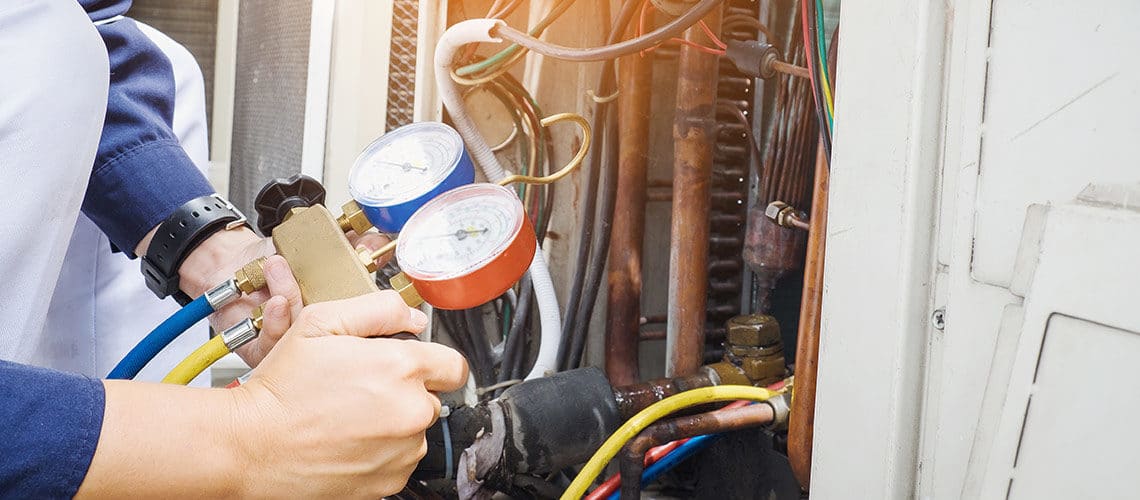Keep Your HVAC System At Its Best with Help from DMAKS HVAC.
Keep Your HVAC System At Its Best with Help from DMAKS HVAC.
Blog Article
Energy-Efficient A/c Systems to Conserve on Energy Costs
As energy costs continue to rise, the relevance of energy-efficient a/c systems ends up being progressively evident. These systems not only promise considerable savings on utility bills but additionally add to an extra lasting future by lessening energy consumption. With various options readily available, consisting of geothermal heatpump and ductless mini-splits, homeowner deal with a wide range of options that can boost comfort and air quality. Recognizing the essential features and upkeep requirements is essential to maximizing these advantages. What elements should be prioritized when choosing the best system for your demands?
Advantages of Energy-Efficient Heating And Cooling Equipments
Energy-efficient Heating and cooling systems supply numerous advantages that prolong past plain price savings. By consuming less power, these systems add to decrease greenhouse gas emissions, assisting to combat environment adjustment and promote sustainability.
In addition, energy-efficient heating and cooling systems frequently give improved comfort degrees. Numerous of these systems feature sophisticated modern technology that permits better temperature control and improved air quality (DMAKS HVAC). This results in a much healthier indoor environment, which is especially crucial for people with allergies or breathing problems
Moreover, buying energy-efficient a/c systems can boost home value. As more customers focus on power effectiveness, homes and buildings equipped with these systems may bring in greater quotes in the realty market.
Types of Energy-Efficient HVAC Options
Just how can home owners and services choose the most ideal energy-efficient heating and cooling options for their demands? The marketplace provides a variety of energy-efficient cooling and heating systems, each created to improve convenience while decreasing energy consumption.
One alternative is the variable refrigerant circulation (VRF) system, which successfully controls the temperature level in several zones within a structure. This system adapts its cooling agent flow to match the wanted temperature, leading to considerable energy financial savings.
Another preferred option is geothermal heat pumps, which make use of the earth's secure temperature to warmth and awesome rooms. By transferring warmth to and from the ground, these systems demonstrate outstanding performance, especially in modest climates.
Additionally, ductless mini-split systems give an energy-efficient option for homes doing not have ductwork. These systems permit zone-specific cooling and heating, decreasing energy waste in vacant areas.
Finally, high-efficiency heaters and a/c unit, with innovative SEER and AFUE ratings, use reputable environment control while consuming less power than typical models. By examining these choices, home owners and companies can choose a HVAC system tailored to their particular demands and power efficiency goals.
Secret Functions to Take Into Consideration

Next, investigate the kind of compressor made use of in the system. DMAKS HVAC. Variable-speed compressors can change their result to match the home heating or cooling down need, leading to boosted comfort and power cost savings compared to single-speed models. Additionally, seek systems furnished with clever thermostats that offer programmable settings and remote accessibility, enabling for far better control over power consumption
An additional crucial feature is the system's air purification capability. High-efficiency filters can Read Full Report boost indoor air top quality and reduce power usage by making sure the system operates successfully. Take into consideration the type of cooling agent utilized; modern systems frequently utilize environmentally friendly refrigerants that have a lower environmental impact.
Finally, ensure that the system is compatible with zoning technology, which enables customized temperature level control in different areas of your home, enhancing convenience while lessening energy use.
Tips for Choosing the Right System


Following, consider power effectiveness rankings, specifically the Seasonal Energy Efficiency Proportion (SEER) for cooling systems and the Yearly Gas Utilization Efficiency (AFUE) for furnace. Greater rankings show greater performance, which can lead to significant financial savings on utility costs gradually.
Additionally, evaluate the type of cooling and heating system that best matches your lifestyle and budget. Choices consist of central air, ductless mini-splits, and heatpump, each with its very own set of advantages and downsides.
Don't forget the value of appropriate installation and sizing; an incorrectly sized system can result in inefficiencies and enhanced wear. Seek advice from with an expert Cooling and heating contractor to get professional recommendations customized to your home's unique needs. This comprehensive technique will guarantee that you pick an energy-efficient a/c system that satisfies your demands and budget plan successfully.
Maintenance for Optimal Effectiveness
When the appropriate heating and cooling system is in location, recurring maintenance comes to be key to making sure optimum effectiveness and long life. A properly maintained system operates better, resulting in lower power intake and decreased energy costs. Regular inspections and tune-ups need to be set up at the very least two times a year-- once prior to the air conditioning season and as soon as before my response the home heating season.

House owners must likewise be alert about monitoring their heating and cooling system's performance. Unusual noises, rising and fall temperatures, or enhanced energy expenses can indicate underlying problems that need prompt attention. By addressing these concerns quickly, homeowners can prevent expensive fixings and prolong the life-span of their systems.
Purchasing a maintenance plan with a qualified service technician not only boosts effectiveness however also supplies satisfaction, understanding that the system is operating at its finest. DMAKS HVAC. Regular maintenance is consequently vital for sustaining power efficiency and decreasing overall functional costs
Conclusion
Finally, energy-efficient heating and cooling systems present a feasible solution for decreasing energy bills while improving convenience and air high quality. By including advanced innovations and options such as geothermal heat pumps and ductless mini-splits, building proprietors can accomplish considerable energy financial savings and add to ecological sustainability. Mindful factor to consider of system attributes and ongoing maintenance even more makes certain optimal performance, making energy-efficient systems a sensible financial investment for both great post to read economic and environmental benefits.
Report this page